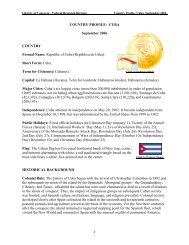1 - American Memory
1 - American Memory
1 - American Memory
You also want an ePaper? Increase the reach of your titles
YUMPU automatically turns print PDFs into web optimized ePapers that Google loves.
19<br />
I wanted the delegation to be aware that the manner in which this<br />
had been submitted to this subcommittee would thrust it right into<br />
that jurisdictional dispute.<br />
Mrs. MixK. May I respond further on that ? With respect to the leg-<br />
islation before the Education and Labor Committee, it was in the<br />
nature of an amendment to the collective-bargaining process. The<br />
issues of compulsory arbitration, the establishment of procedures<br />
whereby agreements were binding upon the parties and all of that<br />
related to the procedures by which these strikes would be settled.<br />
The crippling strike legislation and all of these concepts were in<br />
the nature of revisions or suggested revisions to the procedure. We did<br />
not wish to get into that very dif&cult situation of trying to come up<br />
with suggestions which impinged upon the collective bargaining proc-<br />
ess which in my view is properly in the jurisdiction of the Labor<br />
Committee of which 1 happen to be a member.<br />
This bill seeks only the exemption of cargo, the exemption of Com-<br />
merce with respect to Hawaii. We felt that that was quite different<br />
from seeking to change the collective-bargaining process which I would<br />
have to say would be properly before my own committee in the labor<br />
field. This is why the other bill which goes to the collective-bar^in-<br />
ing agreement we felt would be property before the other coimnittee.<br />
I hope that answers in part some of the questions that you have raised.<br />
Mr. MATSUNAOA. I might also point out, Mr. Harvey, that the ques-<br />
tion was cleared with the leadership and the bill was referred to this<br />
committee after consultation with the leadership.<br />
Mr. H.\R\T.Y. Again, I thank the gentlemen. The difficulty is that<br />
it gives use the impression of an incomplete bill—a bill that pertains<br />
only to the length of the period of injunction; is that correct?<br />
Mr. MATSUNAGA. The bill would amend the Railway Labor Act,<br />
as the gentleman knows, to provide for a 160-day exemption for Ha-<br />
waii, from any interruption of commerce between the west coast and<br />
Hawaii. In the event that a Taft-Hartley injunction of 80 days is<br />
invoked, then the 160-day period is extended by 80 days and will not<br />
continue to run until such time as the moratorium under Taft-Hartley<br />
has expired.<br />
It does in a way relate to Taft-Hartley in that respect. Of course,<br />
if Taft-Hartley is invoked, the conclusion is inescapable that we will<br />
not need this act in order to keep commerce between the west coast<br />
and Hawaii at its normal rate. If a Taft-Hartley moratorium is de-<br />
clared, of course, commerce will be returned to normal and the pro-<br />
visions of this act would bo suspended.<br />
Mr. HARVET. I wish to thank the gentleman from Hawaii.<br />
Senator FONO. Mr. Harvey, may 1 say that the Taft-Hartley Act<br />
has proved very ineffectural in stopping strikes involving Hawaii.<br />
While the Taft-Hartley Act has been in existence we have suffered<br />
as you have seen by our testimony.<br />
Almost one-third of the time in the period from mid-1971 to the<br />
end of 1972 our shipping was struck and the Taft-Hartley Act did<br />
not prove effective. There are certain national emergency require-<br />
ments for invocation of the Taft-Hartley Act, and even when it is<br />
invoked, there is only an 80-day cooling-off period.



![Albert Einstein Papers [finding aid]. Library of Congress. [PDF ...](https://img.yumpu.com/21604228/1/190x245/albert-einstein-papers-finding-aid-library-of-congress-pdf-.jpg?quality=85)





![American Colony in Jerusalem Collection [finding aid]. Library of ...](https://img.yumpu.com/17941275/1/190x245/american-colony-in-jerusalem-collection-finding-aid-library-of-.jpg?quality=85)



![Piccard Family Papers [finding aid]. - American Memory - Library of ...](https://img.yumpu.com/17941234/1/190x245/piccard-family-papers-finding-aid-american-memory-library-of-.jpg?quality=85)


